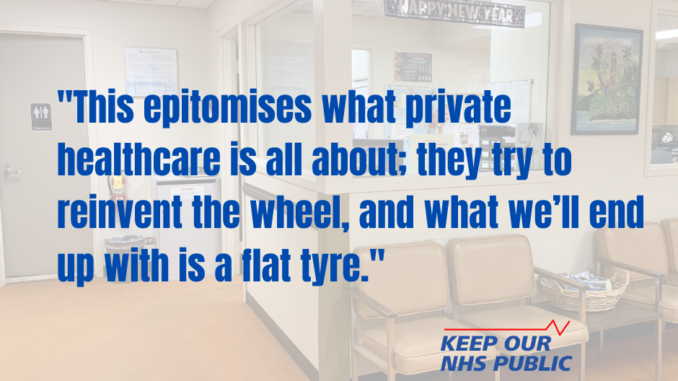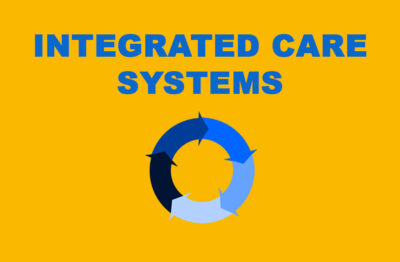
How a US corporation became the biggest provider of primary care in the UK.
Every day at Operose Health at 11am. Sharp. The staff are instructed to take a 10 minute “pause”. In other words, what used to be called the humble tea break. And in many ways, this epitomises what private healthcare is all about; they try to reinvent the wheel, and what we’ll end up with is a flat tyre. In truth, private sector involvement in healthcare is a deeply unpopular prospect, with 76% of Britons wanting an end to privatisation of health services. The old adage of the NHS as “the closest thing the English have to a religion” still rings true.
Why then, is US corporate giant Centene, a Fortune 500 company listed on the New York Stock Exchange, and uncoincidentally the parent company of Operose Health, now in command control of 58 GP surgeries across the UK: making it the largest GP network in the UK? Together, the 58 GP surgeries under Centene’s corporate hand covers approximately 500,000 unwitting patients. This is what the reality of privatising the NHS looks like, covert not overt. Still publicly funded, yet privately provided. Allusion without answerability.
This isn’t without consequence to people like You and I. Namely, the deterioration of care. Privatised GP practices have traditionally failed to employ permanent GP’s relying, instead, on locum provided care. This is shown to be suboptimal, and second-rate to permanent GP’s. Privatisation often robs doctors of their professional autonomy; and subverts patient-centred work into profit-centred work. An oft-cited reason why GP’s leave the profession early. Yet, we have a health system which is dangerously short of 9,000 GP’s, with the shortest consultation time of any economically developed nation. Can we really afford to let the Centene experiment continue on our GP practices?
“Reversión de la sanidad privatizada” the Government of Valencia announced. Literally “reversal of privatised healthcare”. But what prompted such a move? Ribera Sauld, a Spanish healthcare company currently under police investigation for fraud, overcharging and issues with subcontracting. The company’s practices led to a complete reversal of a once popular policy. But 90 per cent of Ribera Sauld is owned by Centene, the same Centene running the 58 GP practices under its UK subsidiaries. A glimpse into the future of how bad things may become.
What makes private healthcare so easily exploitative of us, the unwitting patients, is the asymmetry of information. Nobel laureate, Kenneth Arrow used the analogy of the medical market not being a simple product such as a box of screws, instead it is subject to major information asymmetries as the healthcare professional will usually know more than the patient. That’s the inherent danger of privatisation, to us, the eventual patients.
In Medicine, we have a term for when the medication becomes the malady: iatrogenesis. Examples are innumerable: anticoagulation medication saving you from a heart attack but causing a massive bleed in the brain. Or being the unfortunate one person out of every 2000 people developing cancer from a CT scan. And if a struggling NHS was our patient, subjecting it to privatisation by US corporations would be no different to iatrogenesis, the treatment being far more destructive. But by no means is this a treatment, many of the US corporations making in-roads into the heart of NHS have been involved in numerous fraud cases. United Health paid $2.9 billion, McKesson paid $350 million, Aetna paid $170 million. All of these corporations are already involved in the provision of NHS services, publicly financed. And now, Centene joins the growing club in managing the “NHS PLC”.
The NHS has been held in such great reverence, but reverence is not without rationale. Despite, funding for the NHS being the second-lowest in the G7 at just £2,989 per person, the NHS was ranked as the best healthcare system in the world by the Commonwealth Fund, besting private insurance and public-private models. The optimum treatment for the NHS is not iatrogenic reinvention, but to maintain the publicly funded-publicly provided infrastructure.
It’s easy to envisage within the next few years of visiting a GP practice, owned and operated by Operose Health, referring you in your time of need to a hospital operated by a separate private provider. An NHS butchered and fragmented. Even though this will still be free at the point of care, in line with Aneurin Bevan’s principles, it is not without consequence. So, the doctor will indeed still see you; but, how and why, that’s a different matter altogether.
Jatinder Hayre is a medical student, researcher, and campaigner. He has an interest in Health Inequalities and recently co-authored 'SAGE Report 21: COVID-19 and Health Inequalities'. He is a member and spokesperson for Keep Our NHS Public.







We must resist the insidious privatisation of our NHS by stealth. NHS staff cannot do much about it. They know services are being cut and under mined but are unable to make a stand without compromiseimg patient safety. Public opinion must be mobilized. Political leaders must be under no illusions – save our NHS or loose your seat in Parliament. That should focus minds. OTHERWISE THE WORKHORSE LOOMS and chaos like we have never seen before will be upon us.
I always knew that the Conservatives have been planning to reverse the nhs acts 1946 Et 1948. We have head of NHS England Simon Stevens CV head NYC Dept of Health.We Jeremy Hunt & Matt Hancock both Advocates for Privatisation Foi